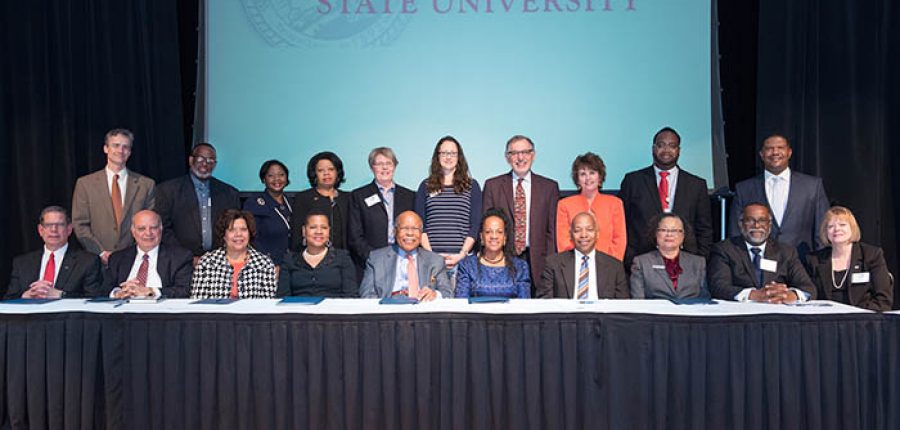NC Colleges, Universities, State Agencies Gather to Create New Alliance for Health Professions Diversity

Former HHS Secretary and Chairman of The Sullivan Alliance to Transform the Health Professions, Louis W. Sullivan, MD, met with senior officials from 20 North Carolina colleges, universities, statewide organizations, as well as state and local health agencies to formally create a statewide alliance to increase minority representation in the health professions. This new academic and state agency partnership – The North Carolina Alliance for Health Professions Diversity (The North Carolina Alliance) – aims to reduce disparities in health status and health care by increasing racial and ethnic diversity in the health care workforce in the state of North Carolina, thereby creating a future health care workforce that is increasingly proficient in cross-racial and cross-cultural interactions.
During the official ceremony on March 27, 2015, held on the Winston-Salem State University campus, senior representatives from the 20 colleges, universities, and state organizations and agencies signed the Memorandum of Understanding (photo above).
“We are impressed that North Carolina’s AHEC, Historically Black Colleges and Universities, state universities, community colleges, and state and local health agencies have all committed to working together to create a more diverse health workforce,” said Sullivan.
“These academic, state and local health leaders clearly recognize that in the current environment, with millions more Americans securing health insurance, they still won’t have access to care unless there are more health professionals available to serve them.”
Participating colleges, universities and state health agencies include: Bennett College, Campbell University, Davidson Community College, East Carolina University, Elon University, University of North Carolina Greensboro, North Carolina Central University, High Point University, Appalachian State University, Elizabeth City State University, Fayetteville State University, Johnson C. Smith University, St. Augustine’s University, Western Carolina University, Winston-Salem State University, NC Area Health Education Centers Program, NC Department of Health and Human Services, Wake Forest Baptist Medical Center, and the Forsyth County Department of Public Health.
“With so many North Carolina Alliance members working together to address the state’s shortage of health professionals, I am confident we can increase the racial and ethnic diversity of newly-trained health professionals and improve access to health care across North Carolina,” said Peggy Valentine, EdD, North Carolina Alliance co-founder and dean of the School of Health Sciences, Winston-Salem State University.
The North Carolina Alliance was originally co-founded by Tom Bacon, DrPH, former director, and Jacqueline Wynn, MPH, associate director, of the North Carolina Area Health Education Centers Program and Valentine. Through this partnership, the first NC Health Professions Diversity Conference was held from March 31 to April 1, 2008 in Greensboro, NC. Over 150 health professionals, educators, policymakers and legislators attended. The conference produced a number of recommendations to increase the representation of diverse students in health professions programs. One of the key results of the conference was the formation of a steering committee with representatives from various health professions schools, the community college system, and local health organizations. The group engaged in a strategic planning process in 2010 and meets on a regular basis to dialogue on issues that affect diversity. The second North Carolina Health Professions Diversity Conference was held August 29–30, 2012, in Greensboro and over 200 participants attended.
“We are delighted to work with colleagues from around the state to address this important issue,” Valentine added. “As our state and nation become more ethnically diverse, we will need a health professions workforce that mirrors our population in an effort to reduce health disparities.”
North Carolina is among the most diverse states in the nation, and ranks ninth with respect to percent of African Americans (22%). African Americans, Hispanics/Latinos (8.9%), American Indians/Alaska Natives (1.6%), and Native Hawaiians/Pacific Islanders (0.1%) constitute 32.6% of the state’s population. But in North Carolina, minorities constitute only one out of six health professionals.
Licensed practical nurses (LPNs) and primary care providers are the two professions with diversity comparable to the statewide population (around 30% non-white). Nearly four out of five minority health care providers are located in metropolitan counties, thus emphasizing the need to bolster rural health care access.
The Health Resources and Services Administration (HRSA/HHS) has designated 134 primary care health professional shortage areas (HPSAs) statewide, which encompasses a population of over 1.2 million residents. Projections anticipate the need for 184 primary care providers to be added to the workforce to remove the shortage designation.

About the Sullivan Alliance to Transform the Health Professions
Under the leadership of Dr. Louis W. Sullivan, former U.S. Secretary of Health and Human Services, the Sullivan Alliance to Transform the Health Professions was organized in January 2005 to act on the reports and recommendations of the Sullivan Commission (Missing Persons: Minorities in the Health Professions, September 2004), and the Institute of Medicine Committee on Institutional and Policy-Level Strategies for Increasing the Diversity of the U.S. Healthcare Workforce (In the Nation’s Compelling Interest: Ensuring Diversity in the Healthcare Workforce). The Alliance’s goal is to provide the focused leadership, deep commitment, and sustainable efforts that will result in the addition to our nation’s workforce of more well-trained health professionals from racially and ethnically diverse backgrounds able to provide quality health care and innovative research in the decades ahead.
